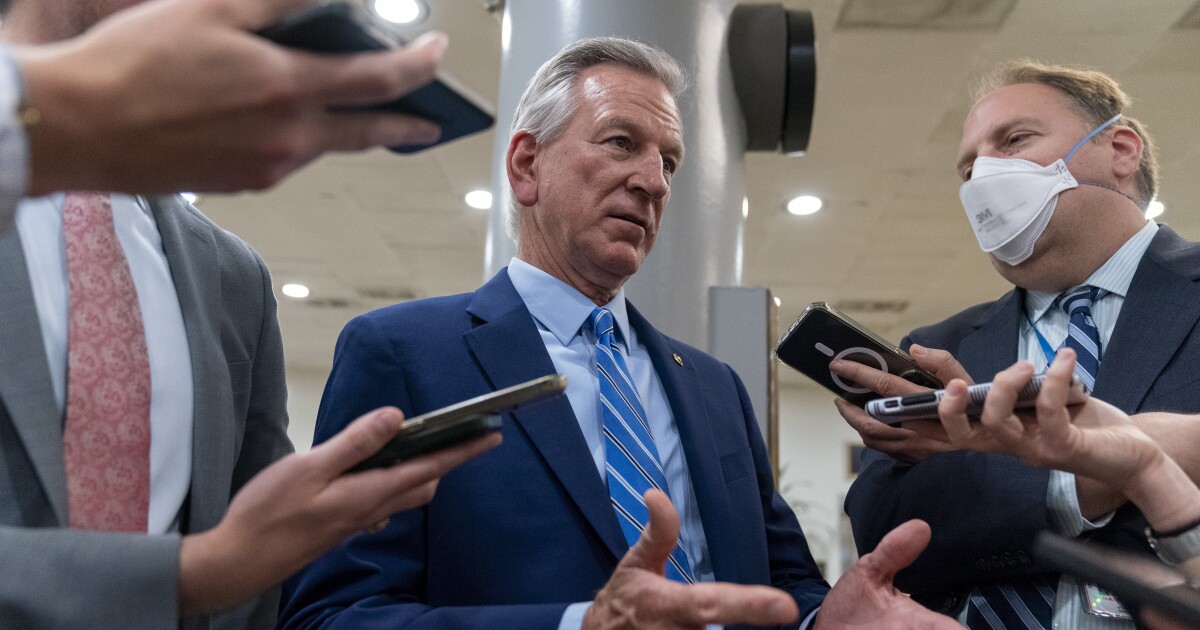

The
Department of Defense in February
released
a series of new policies that allow for time off and travel expenses for reproductive healthcare, including abortion
, for troops and their dependents in states where it is not available.
The new policies were designed to improve troops’ access to reproductive healthcare after the Supreme Court decision in
Dobbs v. Jackson Women’s Health Organization
last year, which eliminated the constitutional right to abortion, creating a patchwork of laws across the country.
SPACE RACE: THE LATEST INNOVATIONS US AGENCIES HAVE FOR EXPLORING SPACE
In protest of the new policies, one Republican senator has single-handedly held up roughly 250 promotions for all civilian, flag, and general officer nominations, as well as high-level promotions within the Pentagon, setting up the first major clash this session over abortion access on Capitol Hill since the Supreme Court decision last year.
Sen. Tommy Tuberville (R-AL) is utilizing his senatorial powers to delay promotions that are subject to confirmation by the chamber and are typically approved swiftly with no controversy. The push by the Alabama senator, whose home state has six military installations with laws on the books banning abortion even in cases of rape or incest, is now dragging into its fourth month.
The college football coach turned senator believes the policy is a violation of federal law that limits federal funding of abortions to cases of rape, incest, or threats to the life of the mother. He maintains his objections also have to do with forcing taxpayers to “fund abortions,” and that the Pentagon policy was the equivalent of the department bypassing Congress and doing its own legislating.
“It’s an illegal policy. They changed it, they can’t do it, so let’s go back to the original policy,” Tuberville said on Thursday, speaking to the Washington Examiner. “If they want to change it, let’s change it here in Congress, like we are supposed to.”
“For y’all’s sake, the people of this country, we can’t have them legislating from the Pentagon, making laws,” he added.
The backlog of Pentagon nominees, which could grow to as large as 650 by the end of the year, is typically approved without objection, usually in batches. Tuberville lacks the power to block the promotions entirely — Senate Majority Leader Chuck Schumer (D-NY) can still put them up for a vote — but the hold basically forces him to do so one by one, eating up valuable floor time.
Schumer has refused to take that step, believing it would signal to other senators that they can use the holds as leverage. That has left the Senate at a standstill over the promotions, with no end in sight.
Pentagon officials have warned it’s having an effect on national security and military readiness. The White House this month also condemned the senator’s strategy.
“What the senator is doing by holding these nominations, it’s a threat to our national security. Period. That’s what he’s doing,” White House press secretary Karine Jean-Pierre told reporters.
National Security Council spokesman John Kirby this month also called on Senate Republicans
to help find a path forward.
“We certainly urge and encourage other members of the Senate on the Republican side to put enough pressure on Senator Tuberville to get him to lift his hold,” Kirby said during an interview on CNN. “I’m grateful for the work other Republican senators have done to try to find a way through this.”
The Alabama senator said since his hold has been in place, he has not had any conversations with Sen. Jack Reed (D-RI), the chairman of the Armed Services Committee, Schumer, or the White House. He also said Thursday that Senate Minority Leader Mitch McConnell (R-KY) has not discussed the hold with him either, despite telling reporters last month that he does not support it.
Behind the scenes, some of Tuberville’s colleagues have tried to talk with him about alternatives, which could suggest Republican leadership is growing weary of the stalemate. Sen. Joni Ernst (R-IA), the No. 4 Republican in the Senate, introduced a bill in March that would reverse the policy and floated to Tuberville a committee vote on that measure as part of the National Defense Authorization Act. In exchange, Tuberville would drop his hold, but he hasn’t been satisfied with that offer.
“Schumer is not going to bring it to the floor. So, I’m not going to drop holds, knowing it’s not even going to make it out of this committee,” Tuberville said.
Sen. John Cornyn (R-TX)
, who formerly served as McConnell’s No. 2, said he continues to have conversations with Tuberville.
“I’m talking to a number of colleagues to figure out how to make the point that Senator Tuberville wants to make, which I agree with, but find a way to allow Congress to decide the issue rather than just the Department of Defense,” Cornyn said speaking with the Washington Examiner on Thursday.
“I think Senator Schumer has the ability to move these nominations. He just needs to file for cloture, and you know he could do maybe 10 a week if he decided that this was a priority, but he likes politics,” Cornyn added.
Other Republican members of the Senate Armed Services Committee also are placing the blame squarely on Schumer.
“There is a way forward, and it’s for leader Schumer to put these nominees on the floor. Schumer has had three months to put them on the floor and take votes,” said Sen. Deb Fischer (R-NE), a member of the panel. “He’s the one I would say that is holding up the ship.”
CLICK HERE TO READ MORE FROM THE WASHINGTON EXAMINER
Last week, Sen. Ben Cardin (D-MD) came to the Senate floor to ask for unanimous consent to confirm the Naval Academy superintendent nominee, but Tuberville blocked the nomination for a ninth time.
“This is the ninth time that I’ve come to the floor to keep my word,” Tuberville said in response on the floor of the Senate. “Since the last time we did this, nothing has changed. And so, my hold will remain in place.”





